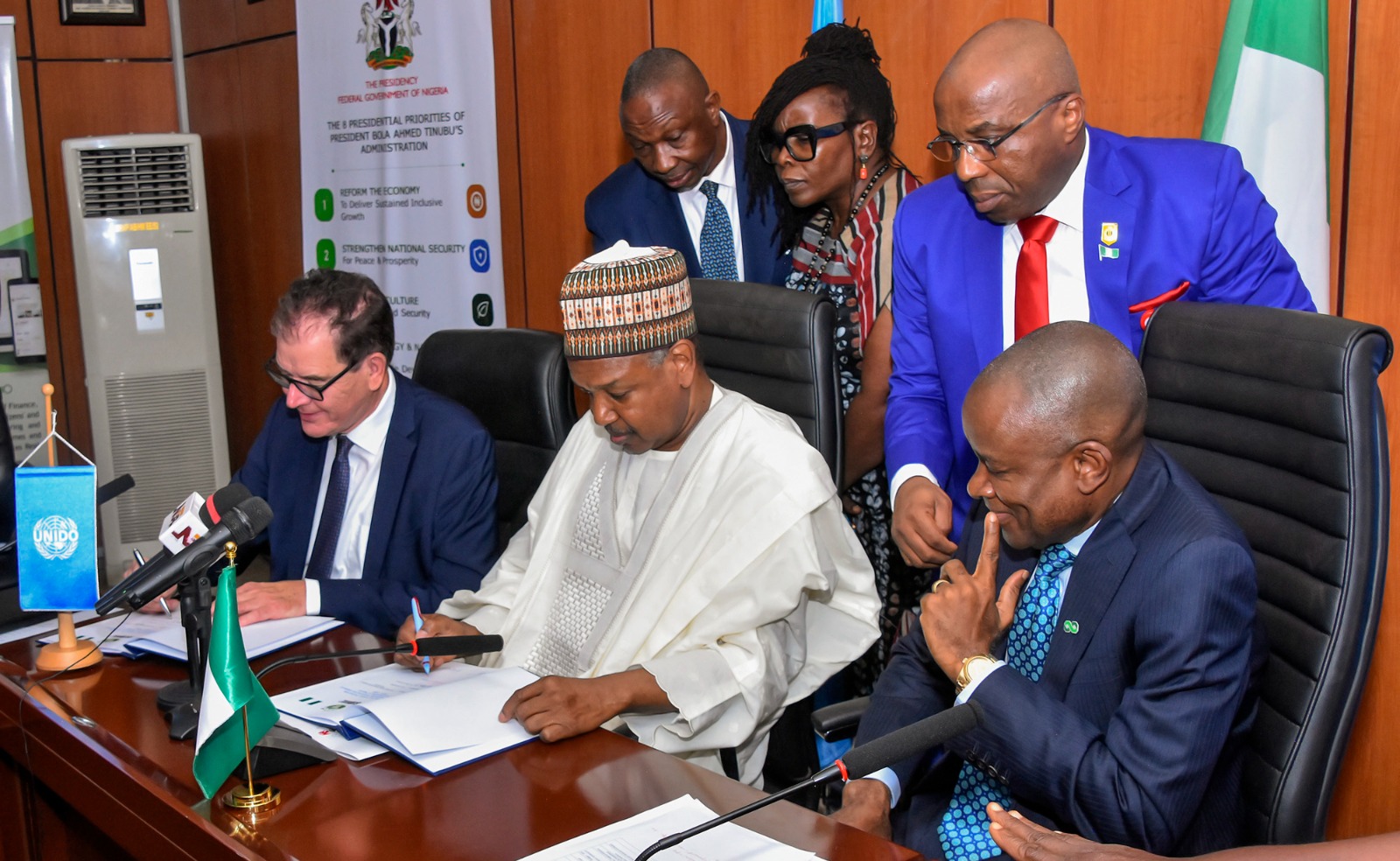By Nana Musa/ Lucy Ogalue
The Federal Government has signed a Programme for Country Partnership (PCP) agreement with the United Nations Industrial Development Organisation (UNIDO) to drive Nigeria’s industrial transformation.
At the signing ceremony in Abuja on Wednesday, the Minister of State for Industry, Sen. John Enoh, emphasised the significance of the agreement in repositioning the country’s industrial sector.
Enoh said that the partnership aligned with Nigeria’s commitment to rebuilding its industrial base to achieve structural economic transformation.
He said that the Industrial Revolution Work Group (IWG) had been inaugurated to coordinate the revitalisation of key industrial assets and value chains.
According to Enoh, the partnership comes at a time when Nigeria is moving with clarity and urgency to rebuild its industrial base.
He said that it would boost economic growth, and also ensure structural transformation that empowers the people and reduces dependency on primary exports.
Enoh said that the IWG, which he co-chaired with the President of the Manufacturers Association of Nigeria (MAN), Francis Meshioye, was a stakeholder platform designed to address systemic bottlenecks and fast-track industrial zone development.
The minister said that the PCP aligned with the objectives of the IWG, focusing on agro-industrial transformation, SME development, green and digital transition, and skills for industrial competitiveness.
He expressed optimism that UNIDO’s technical expertise and global perspective would enhance Nigeria’s industrialisation efforts through infrastructure development and catalytic interventions.
“We welcome your presence at the table and look forward to integrating your insights into the group’s core operations.
“Nigeria is laying the foundation for the next chapter in its industrial history by modernising institutions, reforming policies, and strengthening coordination across all levels of government,” he said.
Enoh reiterated the government’s commitment to fostering multilateral and bilateral cooperation, urging all stakeholders to transition from agreements to tangible execution.
“As we sign today, we do so with resolve not for the ceremony, but for community-medium impact.
“Let us move together from potential to productivity, from agreement to execution, and from policy to prosperity,” he said.
The Minister Budget and Economic Planning, Sen. Abubakar Bagudu, said that the PCP was expected to boost manufacturing, enhance access to renewable energy, and create opportunities for small and medium enterprises (SMEs).
Bagudu said that it would also strengthen Nigeria’s participation in the African Continental Free Trade Area (AfCFTA).
He reaffirmed the government’s commitment to ensuring the successful implementation of the programme, adding that Nigeria remained open to international investments and partnerships.
“Nigeria is determined to achieve its economic vision, and we will stay the course,” he said.
The UNIDO Director-General, Gerd Müller, described the PCP as a new phase in Nigeria’s longstanding partnership with the organisation, which dates back 40 years.
“This initiative focuses on six key areas, including industrial policy, innovation and technology, value chain development, and sustainable energy solutions.
“It will directly support Nigeria’s National Development Plan and the African Union’s Agenda 2063,” Müller said.
The UN Resident and Humanitarian Coordinator, Mohammed Fall, emphasised that the signing of the PCP marked the beginning of a long-term collaboration to drive Nigeria’s sustainable development.
Fall acknowledged the challenges facing the country but reaffirmed the UN’s commitment to working alongside Nigerian authorities and development partners to implement impactful initiatives.
He highlighted the role of UNICEF and other UN agencies in supporting Nigeria’s economic and humanitarian efforts.
He assured stakeholders that the UN remained dedicated to helping Nigeria transition toward a more resilient and self-sufficient economy.
The News Agency of Nigeria (NAN) reports that the signing ceremony was attended by representatives of Government, the European Union, UNIDO, and other key stakeholders in Nigeria’s industrial sector.
NEWS AGENCY OF NIGERIA

